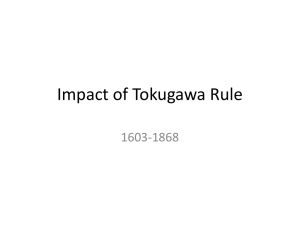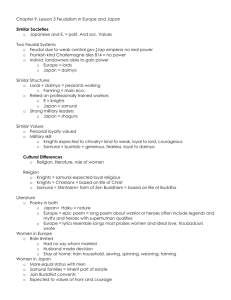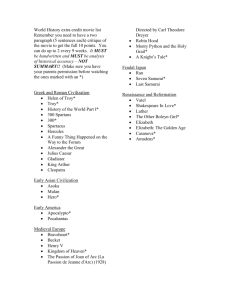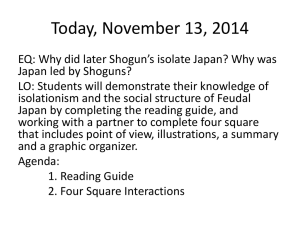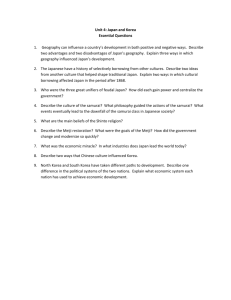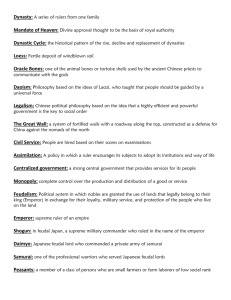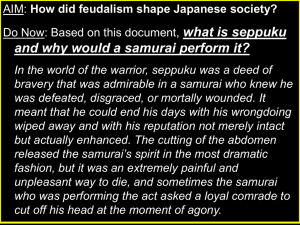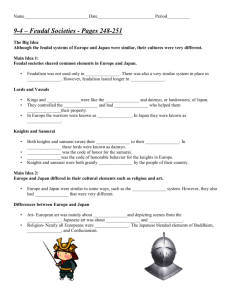Set Up a Samurai Training School
advertisement
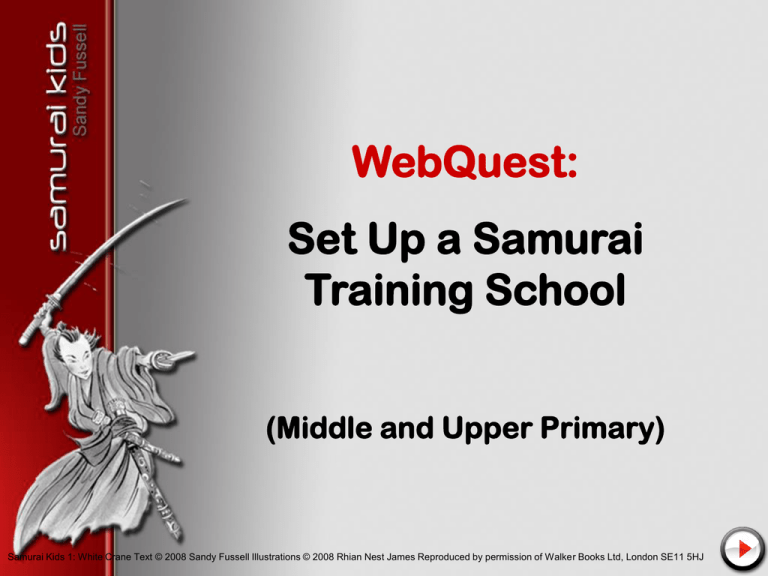
WebQuest: Set Up a Samurai Training School (Middle and Upper Primary) Samurai Kids 1: White Crane Text © 2008 Sandy Fussell Illustrations © 2008 Rhian Nest James Reproduced by permission of Walker Books Ltd, London SE11 5HJ 1. Introduction Niya teases Sensei and says he might start his own ryu training school. The bath is filled with cool mountain spring water. I sink until, like a frog, only my eyes are visible. Fear of failure floats away with the mud. There is nothing wrong with being a frog. Maybe, when I am Sensei, I will build the Frog Ryu. ‘Maybe you will,’ the wizard says inside my head. ‘But now it is time to hop out and let someone else bathe.’ (chapt. 11 p. 105) Your task is to help Niya set up the Frog Ryu by becoming one of the teachers. 2. Task Your team must find out about samurai training – what did the students learn, how did they learn, what equipment did they need? Each team member will assume one of the following roles: • • • • • • Archery Teacher Wrestling Teacher Haiku Teacher Zen Master Ikebana Instructor Sword Master One person may teach more than one subject. Unfortunately you won’t get paid. The samurai teacher was considered invaluable so a price could not be put on his/her services. However, your students might bring you offerings. 3. Process 1.Choose one or more roles • • • • • • • • Archery Teacher Wrestling Teacher Haiku Teacher Zen Master Ikebana Instructor Music Teacher Sword Master Origami Teacher 2.Click on your role (listed above) to see which websites you will be visiting to research your new job 3.Prepare a report on what you will be teaching, and how you will teach it. 4.Prepare an exam of 5 questions to test your students’ knowledge. 5.The team’s reports and exam paper will form the new Frog Rye teaching program. The Calligraphy Teacher Sample report Japanese calligraphy is called shodo, ‘the way of writing’. It is considered an art. The strokes of the characters have to be done in strict order. Straight lines should be strong and clear, and curving lines should be delicate and mobile. The shape and position of the characters drawn, the gradation of the ink, and the force of the brushstrokes are all important. Kanji is one of the three character sets. Traditionally, kanji are written in vertical columns from the right to the left side of the page. Calligraphy is signed with a red seal – the artist’s name. Calligraphy is best taught in the classroom where there is a stable flat surface. The materials needed are a black mat, a bamboo and animal hair brush (fude), black ink, special paper (washi) and a metal weight to hold the paper down. The ink, called sumi, comes from charcoal sticks which must be rubbed with water on an inkstone until the right consistency is achieved. The Calligraphy Teacher Sample Exam 1.What is the Japanese name for calligraphy? 2.In what direction is calligraphy written? 3.How many character sets are there? 4.What materials are needed? 5.Where does the ink come from? The Archery Teacher The archery teacher will visit: Samurai Longbow Samurai Arrows Wikipedia – Yabasume archery Kids Web Japan – Yabasume & Kyudo How Stuff Works: Samurai: Training for Life and War (excellent picture) Mounted Samurai Archers in Japan today (recreation with photos) The Wrestling Teacher The wrestling teacher will visit Jujitsu (samurai unarmed combat) Wikipedia – Jujitsu You Tube – samurai and jujitsu The Haiku Teacher The Haiku teacher will visit Wikipedia - haiku Haiku and poems by samurai Haiku – A definition Matsuo Basho – famous samurai haiku poet Haiku – ‘how to’ especially for kids The Zen Master The Zen Master will visit Samurai and Zen Wikipedia - Zen Wikipedia – koans A list of popular Zen koans David Suzuki – the man who brought Zen to the West (Japan Times article 2006) The Ikebana Instructor The Ikebana Instructor will visit Wikipedia – ikebana Kids Web Japan – Ikebana The Basic Styles Japan Lifestyle – Picture Gallery The Music Teacher The Music Teacher will visit Wikipedia – the koto Wikipedia – the shamizen Wikipedia – the taiko drum Riley Lee – Australian Grand Master of the shakuhachi flute (listen to samples) The Sword Master The Sword Master will visit Samurai katana Samurai Sword making Samurai Sword Facts Castles of Japan Thinkquest War, warfare & Weapons in medieval Japan How Stuff Works: Samurai: Training for Life and War (excellent picture) The Origami Teacher The Origami Teacher will visit Wikipedia – Origami Kids Web Japan – origami overview Easy origami History of Origami Joseph Wu – Origami Master (visit the gallery) 4. Evaluation Simple evaluation. Max Points Research Thoroughly researched topic 10 Effectively used technology 10 Collaboration Worked well as a team member 10 Presentation Neat and edited 10 Accurate 10 Submitted on time 10 Identified equipment needed (rpt) 10 Produced teaching scenario (rpt) 10 Created exam test 10 Demonstrated solid knowledge of topic 10 100 Self Assess Teacher Assess 5. Conclusion Congratulations. You have not only helped Niya establish the Frog Ryu, but learned some interesting information about samurai training.
